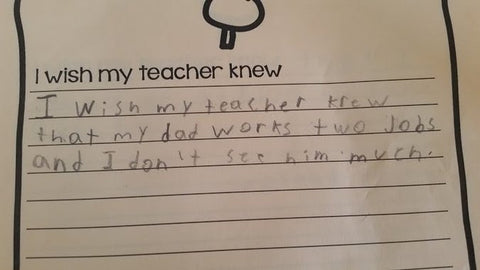#IWishMyTeacherKnew

Educational Statistics Just Got Real…
Have you heard of the book called “I Wish My Teacher Knew: How One Question Can Change Everything For Our Kids”? It’s very popular at bookstores and has been shared countless times on social media outlets like Facebook and Twitter.
While it is a heartbreaking read, it is an honest depiction of realities the students in our classrooms face once they step outside the classroom. The book sheds light on the issues our students wish we, as their teachers, knew about them. Things such as poverty, housing insecurity, family, loss, grief, abuse, and neglect. While the book serves as a huge wakeup call, it also shows how educators can cultivate an understanding of these issues to become better teachers and role models.
Oftentimes, we may wonder why a certain child isn’t acting normally. We may question why the child is angry, misbehaving, or shutting other children out. However, if we took the time to truly listen to them, what would they tell us?
One card featured in the book says, “I wish my teacher knew that my mom might be diagnosed with cancer this week and I’ve been without a home 3 different times this year alone.” If we simply asked a child such as this one how they are doing, couldn’t we make a more positive impact?
As educators, our roles aren’t limited to “just” being a teacher: we’re a role model, a guide, a parent, safety, help, a mandated reporter, a leader, and so much more. Our hats are many and varied, and sometimes kids need something we don’t realize we should be offering.
If one of your students told you that they wished you knew “that my little brother gets scared and I get worried about getting up every night,” wouldn’t you give that child a little more leeway for being tired during the day? Would you talk with them and help them figure out strategies? Of course you would! Whether you would help isn’t the question… but how.
We all believe it is really important to understand a student on a personal level. They need to release their emotions, their views, their sweet ideas. However, sometimes we become too judgmental and miss a lot without intending to do so. By reminding ourselves to connect to students in a personalized and private manner, we can create a more compassionate community for learning and support. Some students are tagged as "disruptive" just because we don’t know the root cause of their problem. Unfortunately, so many of the problems our children bring into the classroom result from things teachers and students have little control over.
Not all of the cards in the book are sad, of course. “I wish my teacher knew I love my family.” “I wish my teacher knew I want to learn more about history.” Many are sweet, endearing words that bring so much joy to a teacher’s heart.
Now that school’s back in full swing, think about building on the special relationships you have with your students. Share something personal about yourself. I bet my students would be surprised to hear about my latest mistake or the last time I felt afraid. Creating an atmosphere where students feel free to share more of themselves, giving you a deeper understanding of those precious souls in your care, can lead to a more enriching experience for all.
So the next time you step into your classroom, before you tackle fractions, history, or the vocabulary word of the day, consider asking your students this simple question: What would I be surprised to know about you?

Leave a comment